Black Dyke - A Century of Recordings - by Tim Mutum
18-Apr-2005Tim Mutum is the foremost authority on brass band recordings, and for this article for 4BR he looks at the plethora of recordings that Black Dyke has made over the years.
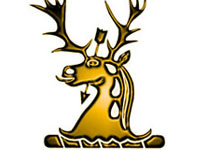 As with so much of brass banding, mention recordings and the name of Black Dyke will crop up and for a whole host of reasons. The most recordings, the conductors involved, the soloists, innovative repertoire recorded, the involvement of musicians from the mainstream world of music and so it goes on.
As with so much of brass banding, mention recordings and the name of Black Dyke will crop up and for a whole host of reasons. The most recordings, the conductors involved, the soloists, innovative repertoire recorded, the involvement of musicians from the mainstream world of music and so it goes on.
My best estimate is that the Black Dyke Mills Band made around 157 wax cylinder and 78 rpm recordings, based on information contained in the marvellous book by Frank Andrews, "Brass Band Cylinder and Non-microgroove Disc Recordings 1903 – 1960". Subsequently, with the advent of the LP/EP and later on the CD, my own records suggest a further 102 recordings, plus a DVD, giving a total of around 260.
This does not take account of contributions made to massed bands concerts such as those at the Royal Albert Hall after the National Brass Band Championships. It is a significant discography which I doubt any other band can match, let alone exceed.
It all started rather innocently in September 1903 with the release on the Gramophone Record label of a single sided 7 inch diameter 78rpm. The piece performed was a march by William German called 'Washington City'. Two more recordings were issued that month and a further two the following month, all on the same label. Frank Andrews lists several more early 78s from this period together with 15 wax cylinders (4 inches long), all released in August 1905 under the name of the Black Dike Band.
There was then a gap until 1923, only part of which can be explained by the First World War, when an abridged version of 'Oliver Cromwell' was released on two 10 inch 78 rpms conducted by the composer, Henry Geehl. Recordings continued to be issued throughout the next 20 or so years even during world war two. The repertoire at this time was a mixture of marches,overtures, hymn tunes, selections, novelties and solos. It is this latter category that stands out as it includes some of the most revered names in the history of the band.
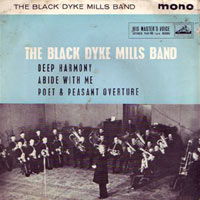 Owen Bottlomley, principal cornet, was featured and his solos included Thomas Lear's 'Shylock' (1933), 'Silver Threads Among The Gold' by Harry Danks (1939) and Arthur Sullivan's 'The Lost Chord' in the same year. Bottlomley was succeeded by the legendary Willie Lang, who later went on to become prinicpal trumpet at the London Symphony Orchestra. Lang featured Toselli's 'Serenade' (1941), 'Jenny Wren' (Davis) and 'Bless This House' (May Brahe) also released in that same year.
Owen Bottlomley, principal cornet, was featured and his solos included Thomas Lear's 'Shylock' (1933), 'Silver Threads Among The Gold' by Harry Danks (1939) and Arthur Sullivan's 'The Lost Chord' in the same year. Bottlomley was succeeded by the legendary Willie Lang, who later went on to become prinicpal trumpet at the London Symphony Orchestra. Lang featured Toselli's 'Serenade' (1941), 'Jenny Wren' (Davis) and 'Bless This House' (May Brahe) also released in that same year.
The other featured soloist during this period was Master Jack Pinches (the title presumably referring to his young age). His two major contributions in 1940 were the Johnny Greenwood compositions 'The Acrobat' and 'The Jester', both recorded on His Master's Voice.
The end of the 40s and the 1950s saw the emergence of a number of smaller labels concentrating on brass bands –Levy's, Jamco and the more well known Paxton which went on to issue EPs and 10 inch LPs. Frank Andrews's book shows that perhaps Dyke were the first band to have their winning performance at the Royal Albert Hall National Finals recorded 'Freedom' (Herbert Bath) was recorded ‘live' at the 1947 contest on the Levy's label.
After 1950 Black Dyke saw another lull in their recording activity until 1960 with the release of their first modern day recording - it was 'Le Roi d'Ys' (Lalo arr. Frank Wright) conducted by Major George Willcocks (Paxton PEP 111 – later re-released on a 10 inch LP thus avoiding the turn over of the EP at the beginning of the euphonium solo).
Of all the Paxton recordings this I believe is the one treasured most. It is regarded as one of the great Dyke performances with Tom Waterman (soprano), Maurice Murphy (principal cornet), Sam Smith (flugel horn) and Grenville Richmond (trombome) plus also, of course, Geoff Whitham performing the soaring euphonium solo.
Jack Emmott was bandmaster at the time and he led Black Dyke in a number of recordings on Paxton and EMI, although by the time the first 12 inch LP for the latter company emerged in 1964 Geoffrey Whitham and Colonel ‘Jiggs' Jaeger were conducting. The 1960s saw an explosion in brass band recordings and Black Dyke were in on the party in a big way. There were further issues with Paxton but this decade and the beginning of the next will be remembered for two reasons.
Firstly, there was the little matter of one of The Beatles. Paul McCartney produced a single of the band on the Apple label of 'Yellow Submarine' and 'Thingumbybob' and this was one of Geoffrey Brand's first recordings with the band as professional conductor. Secondly, it was the beginning of a very fruitful partnership in more ways than one as in that same year, 1968, Black Dyke's first LP for the Pye Golden Guinea Top Brass series was released. 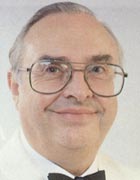 The LP ‘The Champions' in which the conducting is shared with Roy Newsome, is another one of those cult recordings. It celebrates the 1967 National win on Eric Ball's 'Journey Into Freedom', which concludes the LP which also features the George Willcocks arrangement of 'David of the White Rock', John Clough, another legend of Dyke, performing a solo which became synonomous with him, Doughty's 'Grandfather's Clock' and the fabulous James Shepherd playing 'Napoli'.
The LP ‘The Champions' in which the conducting is shared with Roy Newsome, is another one of those cult recordings. It celebrates the 1967 National win on Eric Ball's 'Journey Into Freedom', which concludes the LP which also features the George Willcocks arrangement of 'David of the White Rock', John Clough, another legend of Dyke, performing a solo which became synonomous with him, Doughty's 'Grandfather's Clock' and the fabulous James Shepherd playing 'Napoli'.
In total Black Dyke recorded twelve LPs for Pye, two more of which must be mentioned. In 1968 Dyke under Geoffrey Brand and Roy Newsome recorded three LPs on Pye's full price label – the NSPL series. One of them was their first really major project. It was Gilbert Vinter's 'The Trumpets' – a cantata for bass solo, mixed chorus, brass and percussion. It featured Michael Langdon (bass), the augmented Huddersfield Glee and Madrigal Choral Society and Maurice Murphy on trumpet. 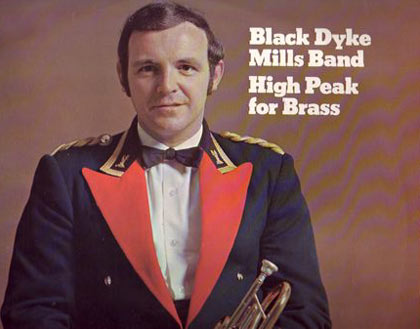
LP Cover: High Peak for Brass
Secondly, 'High Peak for Brass' (Pye GSGL 10453 – 1970). In Brand's eyes you didn't have to win the contest to justify recording great music – in fact the LP was recorded the week before the National Finals. On this LP he premiered Eric Ball's 'High Peak' and also recorded Gilbert Vinter's 'Spectrum' (Brighouse and Grimethorpe won the respective National and Belle Vue contests). Significantly, Black Dyke remain the only band to record 'High Peak' having included it on their Eric Ball tribute CD in 2003! Over a ten year golden period Brand and Newsome were involved in no less than 25 recordings with the Black Dyke Mills Band.
Towards the end of the Brand era Black Dyke recorded for the Decca Sounds of Brass series and then teamed up with RCA in yet another fruitful partnership. Joining this half way through was Major Peter Parkes. Brian Couzens made the recordings for RCA and later created Chandos Records. The time with RCA was eventful and indeed the first LP Major Parkes recorded was on RCA's classical Red Seal label (RCA RL 25078 – 1977)– an honour indeed for a brass band – and it enabled Dyke to make its contribtuion to the 1977 Queen's Silver Jubilee with a programme of English music which also provided the opportunity for the band and conductors to place on record the "double" success of 1976 – Fletcher's 'An Epic Symphony' and Ball's Sinfonietta ‘The Wayfarer'. 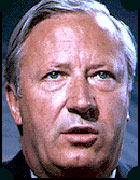 The RCA years also saw the creation of the link with Gordon Langford and the opportunity – another first – to record with the Rt Hon Edward Heath.
The RCA years also saw the creation of the link with Gordon Langford and the opportunity – another first – to record with the Rt Hon Edward Heath.
Black Dyke were the cornerstone of the Chandos Brass label releasing 16 LPs and CDs between December 1979 and October 1989 – another 10 year ‘golden period' in the band's recording history.
During this time there was yet another first as their 1982 LP Blitz (Chandos BBRD 1014) was re-issued as the first brass band CD in 1985. Black Dyke were also involved in one of the biggest selling brass band recordings when their then principal cornet, Phillip McCann, released his first solo album, 'The World's Most Beautiful Melodies' in 1985 (Chandos BBRD 1029).
And of course there was the celebration of the grand slam of contest wins in 1985 with the release the following year of The Complete Champions (Chandos BBRD 1032)– 'Salute to Youth', 'Cloudcather Fells', 'Contest Music' and 'Royal Parks'.
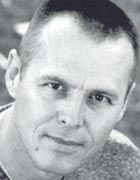 David King's short reign was punctuated by one of the most significant brass band CDs of all time – 'English Heritage' (Albany TROY 051 – 2 – September 1991). Not only was this a more mainstream label but the programme featured all of the brass band music of one of the most eminent English composers, George Lloyd. King's successor was James Watson and he led the band in 22 recordings between 1992 and 2000. This was another "purple patch".
David King's short reign was punctuated by one of the most significant brass band CDs of all time – 'English Heritage' (Albany TROY 051 – 2 – September 1991). Not only was this a more mainstream label but the programme featured all of the brass band music of one of the most eminent English composers, George Lloyd. King's successor was James Watson and he led the band in 22 recordings between 1992 and 2000. This was another "purple patch".
Of those 22 recordings I must highlight four. Firstly, 'A Muse of Fire' (ASV CD WHL 2093) featured music by Sir William Walton with the Shakespearean actor, Robert Portal. In 1996 this highly acclaimed CD won The Music Industries Association award for the Best CD in the Orchestral category. In 1996 Doyen celebrated their 50th release with 'The Planets' (Doyen DOY DOY CD 050) which Peter Wilson, then British Bandsman editor desribed as "An outstanding CD, a real collector's item."
1999 saw the album that Black Dyke recorded with Evelyn Glennie (Reflected in Brass – RCA 09026 632342) nominated in the Crossover Classical Section for a Grammy Award. And, of course, in that year the very familiar 'Ground Force' CD was released (BBC WMSF 6015 – 2). It would also be amiss of me not to mention the follow up Walton CD 'Façade' in which the narration was undertaken by Lady Walton and Richard Baker. (Doyen DOY CD 085).
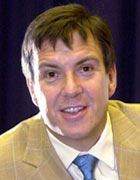 Under Nicholas Childs recordings have continued at a pace. Early in his period as MD Childs handed over to John Pryce-Jones for an eagerly awaited double CD of Handel's 'Messiah' arranged by Dr Denis Wright (Doyen DOY CD 110). There have been the one composer discs – 'Butterworth', 'Gregson', 'Ball' (Michael), 'Ball' (Eric) and 'Graham' - and the magnificent 2 CD set of 'Wilfred Heaton's' music with the International Staff Band. (SP&S 158 CD). Truly, Dyke have been the pacesetters in recording and this celebration year will surely see some outstanding releases.
Under Nicholas Childs recordings have continued at a pace. Early in his period as MD Childs handed over to John Pryce-Jones for an eagerly awaited double CD of Handel's 'Messiah' arranged by Dr Denis Wright (Doyen DOY CD 110). There have been the one composer discs – 'Butterworth', 'Gregson', 'Ball' (Michael), 'Ball' (Eric) and 'Graham' - and the magnificent 2 CD set of 'Wilfred Heaton's' music with the International Staff Band. (SP&S 158 CD). Truly, Dyke have been the pacesetters in recording and this celebration year will surely see some outstanding releases.
Indeed, I am pleased and priveleged to be personally involved in one project which will delight Black Dyke fans the world over. It is tempting to ask the question of what can Black Dyke record next? They have done so much, but with the inspirational Nicholas Childs at the helm I am sure many more recordings will appear to enrich our listening in the months and years ahead. Whatever the future holds, there is certainly a wonderful heritage and permanent record of the world's most famous and successful brass band.
Tim Mutum















